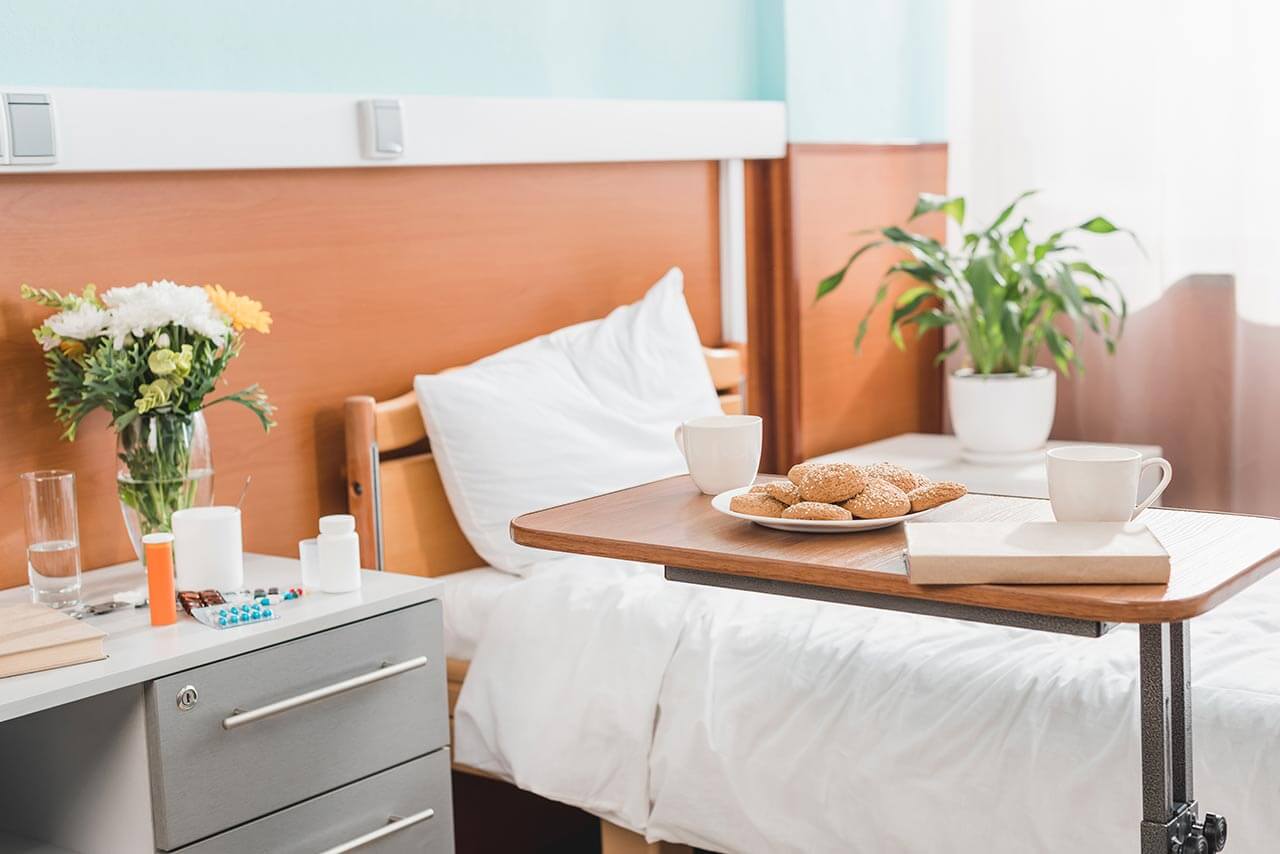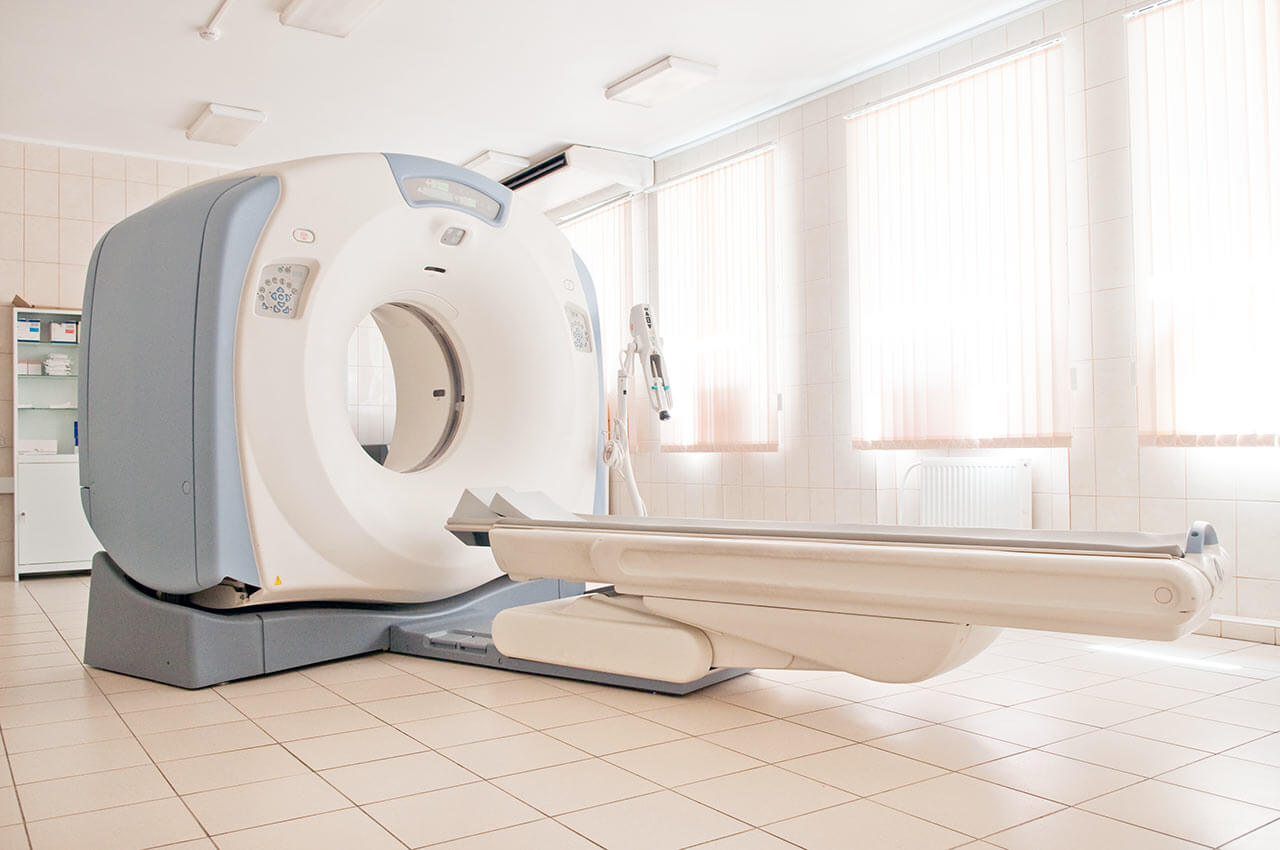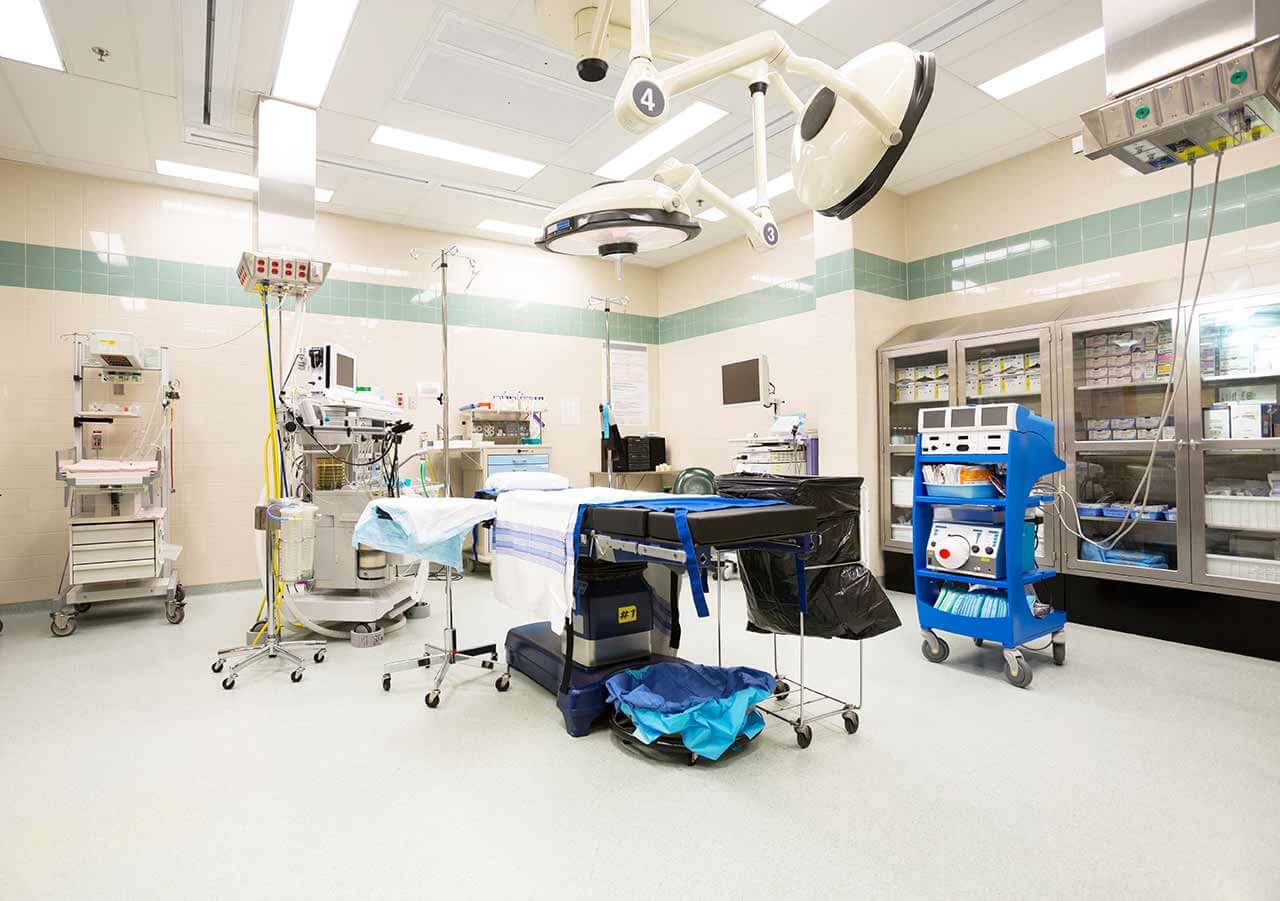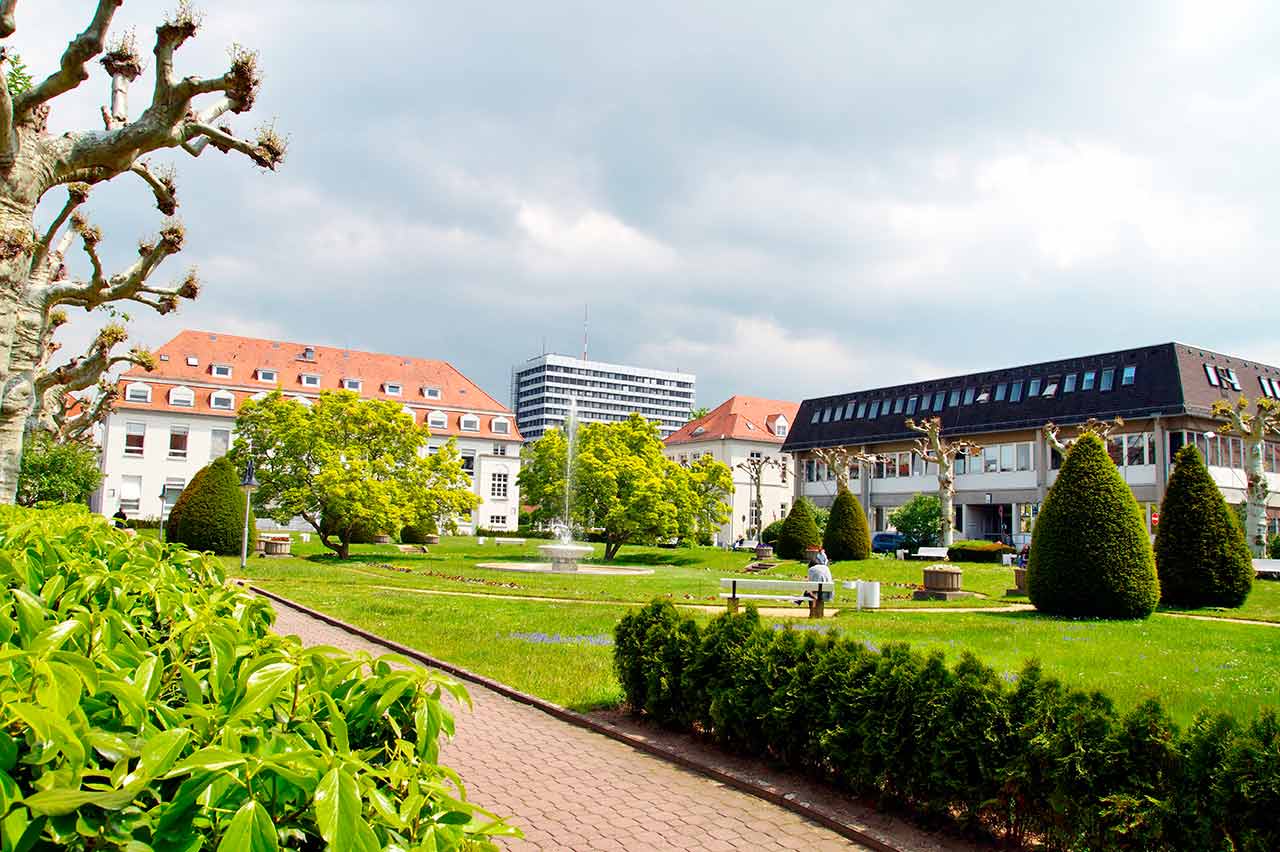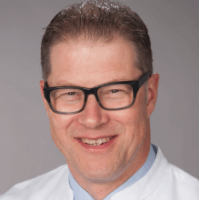
The program includes:
- Initial presentation in the clinic
- clinical history taking
- general clinical examination
- laboratory tests:
- complete blood count
- general urine analysis
- biochemical analysis of blood
- inflammation indicators (CRP, ESR)
- indicators of blood coagulation
- tumor markers, PSA
- ultrasound scan of the urogenital system
- CT scan/MRI
- preoperative care
- nerve-sparing da Vinci prostatectomy
- histological and immunohistochemical
examination of the removed tissues - symptomatic treatment
- cost of essential medicines
- control examinations
- nursing services
- stay in the hospital with full board
- accommodation in 2-bedded room
- elaboration of individual treatment plan
How program is carried out
During the first visit, the physician will conduct a clinical examination and go through the results of the available diagnostic tests. After that, you will undergo the necessary additional examination, such as the assessment of liver and kidney function, ultrasound scan of the abdominal and pelvic organs. Based on the results of the examination, the physician will choose the surgical technique and the type of anesthesia.
Surgery with the da Vinci robot starts with general anesthesia. After anesthesia, the surgeon makes small incisions through which the manipulators of the da Vinci robot and a video camera are inserted into the pelvic cavity. With the help of manipulators, the surgeon ligates the large vessels of the small pelvis, isolates the nerve endings, excises and removes the prostate gland. The video camera continuously transmits a three-dimensional image of the operating field in 12-fold magnification to the monitor.
As the surgeon sees the operating field in multiple magnification, he preserves the nerve endings responsible for erection and urination. Also, normal blood supply of the pelvic organs is maintained after operations with the da Vinci robot. This is the most sparing type of surgical prostatectomy.
After the completion of the operation, you will be transferred back to the ward, under the supervision of the attending physician and nursing staff. Due to the minimal invasiveness of the operation and the short duration of general anesthesia, you will not need to stay in the intensive care unit for a long time. Your urinary catheter will be removed one day after the surgery.
Finally, the attending physician will evaluate the results of control examinations, schedule the date of discharge from the hospital and give you detailed recommendations for further follow-up and treatment.
Required documents
- Medical records
- MRI/CT scan (not older than 3 months)
- Biopsy results (if available)
Service
You may also book:
 BookingHealth Price from:
BookingHealth Price from:
About the department
The Department of Adult and Pediatric Urology at the University Hospital Mainz offers the full range of services in this field. The department specializes in the diagnostics and treatment of diseases of the kidneys, urinary tract and genital organs in men and boys. The doctors of the department have excellent qualifications and easily cope with both functional disorders, inflammatory diseases, and complex developmental defects in boys, severe forms of prostate cancer in adult men. About 4,500 inpatients and 10,000 outpatients are treated here every year. The department is headed by Prof. Dr. med. Axel Haferkamp.
It should be noted that the department performs all modern surgical interventions for the treatment of urologic diseases. In particular, prostatectomy, kidney surgery, bladder removal, kidney transplantation and reconstructive surgery, as well as surgical treatment of urinary incontinence. In addition, new surgical systems are available in the department, for example, the Da Vinci system for high-precision robotic surgery, extracorporeal shock wave lithotripsy to remove kidney stones, organ preservation techniques for the removal of urinary tract tumors, etc.
The diagnostic options of the department include:
- Prostate biopsy
- Ultrasound examinations
- Urological X-ray diagnostics
- Endoscopic diagnostics
- Urodynamic studies
- Laboratory tests (within an inhouse laboratory)
- Other diagnostic studies
The department specializes in the diagnostics and treatment of the following urologic diseases:
- Oncological diseases
- Prostate cancer
- Bladder cancer
- Kidney cancer
- Renal pelvis and ureteral cancer
- Testicular cancer in adulthood
- Penile cancer
- Benign prostatic hyperplasia
- Bladder dysfunction and urinary incontinence
- Weak bladder and pelvic floor muscles
- Urinary incontinence
- Neurogenic bladder
- Sphincter and detrusor dysfunction
- Urogenital fistulas
- Interstitial cystitis
- Urinary tract infections
- Stones in the kidneys, ureters, bladder
- Erectile dysfunction (impotence)
- Pediatric urologic diseases
- Bladder exstrophy
- Duplex kidney
- Epispadias
- Urethral stricture
- Undescended testicles
- Hypospadias
- Hydrocele
- Megaureter (congenital ureteral expansion)
- Neurogenic bladder in meningomyelocele
- Phimosis
- Stenosis of the pelvic-ureteric segment
- Vesicoureteral reflux
- Oncological diseases in children
- Testicular tumor
- Neuroblastoma
- Rhabdomyosarcoma
- Nephroblastoma (Wilms’ tumor)
- Other urologic diseases in adults and children
Curriculum vitae
- 10/87 - 07/91 Study of Medicine, Rhine-Westphalian Technical University Aachen.
- 10/91 - 05/94 Study of Medicine, Philipps University of Marburg.
- 29.09.1989 Preliminary Medical Examination.
- 19.09.1990 First State Exam.
- 15.04.1993 Second State Exam.
- 02.05.1994 Third State Exam.
Clinical Practice
- 03/90 Traumatology, University Hospital Zurich, Switzerland.
- 03/91 Internal Medicine, General Hospital of the spa town of Baden, Austria.
- 07 - 08/91 Neurology, Neurosurgery, Neuroradiology, University of Newcastle, England.
- 03 - 04/92 Urology, Gynecology, St. Barbara Hospital Gladbeck.
Professional Career (admission to medical practice)
- 06.05.1994 Permission to work as an Intern.
- 08.03.1995 Doctoral thesis defense with honors, RWTU Aachen (research of linear and volumetric indices of brain ventricles).
- 08.01.1996 Admission to medical practice.
- 30.08.2001 Medical Specialist in Urology (Medical Association of North Rhine-Westphalia).
- 08.06.2002 Recognized as a Fellow of the European Board of Urology (FEBU).
- 15.07.2005 Habilitation, Heidelberg University.
- 01.10.2008 Optional advanced training, Special Urologic Surgery.
- 15.08.2009 Optional advanced training, Drug Therapy for Tumors.
Professional Career (Positions)
- 07/94 - 09/95 Civil Service: Intern, Department of Urology, Heidelberg University (Head: Prof. Dr. med. G. Staehler).
- 10/95 - 12/95 Intern, Department of Urology, Heidelberg University.
- 01/96 - 04/96 Assistant Physician, Department of Urology, Heidelberg University.
- 05/96 - 04/97 One-year surgical practice, Assistant Physician, Department of Surgery, Heidelberg University (Head: Prof. Dr. med. Dr. h.c. C. Herfarth).
- 05/97 - 04/98 Assistant Physician, Neuro-Urological Ambulatory, Department of Urology, Foundation of the Orthopedic University Hospital (Head: Prof. Dr. med. H.J. Gerner).
- 05/98 - 03/99 Assistant Physician, Department of Urology, Heidelberg University.
- 04/99 - 04/00 Kurt-Engelhorn Research Fellowship, Department of Pathology, State University of New York, Upstate Medical University, Syracuse.
- 05/00 Assistant Physician, Department of Urology, Heidelberg University.
- 08/00 - 12/01 Assistant Physician, Department of Urology, University of Bonn.
- 01/02 - 10/03 Senior Physician, Department of Urology, University of Bonn.
- 01/02 - 10/03 Laboratory Head (Orthopedics, Cardiac Surgery, Urology), University of Bonn.
- 01/02 - 10/03 Kidney Transplant Specialist, Department of Urology, University of Bonn.
- 10/03 - 03/10 Leading Senior Physician and Deputy Head of the Department of Urology, Heidelberg University.
- 07/05 - 03/10 Member of the Advisory Board of the National Cancer Center.
- Since 30.03.2007 Deputy Chairman of the Working Group "Urological Functional Diagnostics and Urology of a Woman" of the German Society of Urology.
- Since 19.04.2010 Head of the Department of Urology, University Hospital Frankfurt.
- Since 2016 Head of the Department of Adult and Pediatric Urology at the University Hospital Mainz.
Photo of the doctor: (c) Universitätsmedizin der Johannes Gutenberg-Universität Mainz
About hospital
The University Hospital Mainz is one of the best maximum care medical facilities in Germany and an internationally recognized scientific center. There are more than 60 departments and institutes, which represent all fields of modern medicine. The hospital serves more than 68,000 inpatients and more than 273,000 outpatients annually, which testifies to the excellent reputation of this medical institution.
The key to the successful clinical practice is also a highly qualified medical staff, which consists of 7.800 employees from various fields. The doctors of the hospital are convinced that each clinical case requires an individual approach, therefore, they devote much time to consultations and communication with patients. The main goal of all hospital employees is to provide an optimal medical care based on the use of the state-of-art diagnostic and therapeutic measures, as well as the introduction of the latest scientific achievements into the medical practice.
The best interns and assistant physicians are trained here. The world-famous leading physicians of the hospital share their long experience and professional skills. Naturally, an integral part of the university hospital work is research, thanks to which many innovative possibilities in the field of diagnostics and therapy have been developed.
Photo: (c) depositphotos
Accommodation in hospital
Patients rooms
The patients of the University Hospital Mainz live in bright, spacious and comfortable rooms. The patient rooms are equipped with modern electronically adjustable beds, which at the touch of a button automatically assume a specified position. Also, there is a TV and a telephone in the patient rooms. To use them, it is necessary to get a prepaid card (in vending machines at the entrance to the hospital). The use of a TV is free, but the patient will need headphones. Telephone calls are made for a fixed fee, which will be withdrawn from the prepaid card at discharge from the hospital. Also, each patient room is equipped with an ensuite bathroom with shower, washbasin and toilet.
Meals and Menus
The patients of the hospital are offered a tasty and balanced three meals a day: breakfast, lunch and dinner. The menu also includes vegetarian and dietary dishes. In addition, for both patients and their visitors there are available cafeterias and bakeries, where one can buy baked goods, snacks, hot and cold drinks.
Further details
Standard rooms include:
